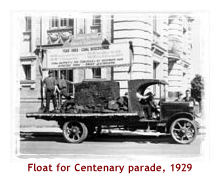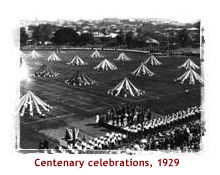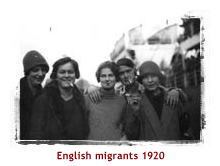 |
Identity 1929
 Perth in 1929 was a small, relatively prosperous provincial capital of
a State which was vast and underpopulated, a city of just 200,000 in a
State with an entire population of just over 400,000. Caught between the
Indian Ocean and the Darling Range, its people lived in the most isolated
city in the world.
Perth in 1929 was a small, relatively prosperous provincial capital of
a State which was vast and underpopulated, a city of just 200,000 in a
State with an entire population of just over 400,000. Caught between the
Indian Ocean and the Darling Range, its people lived in the most isolated
city in the world.
The regional communities of Western Australia were distant from the State's
capital but even more remote from the federal capital. For Western Australians
the rest of Australia, collectively known as 'the eastern States', was
far away. The division of the continent into two halves, an 'us and them'
view of the State's geographic and cultural position, says much about
the mind-set of Western Australians.
 In 1929 a significant proportion of the population was not born in Western Australia. A decade of prosperity had been buoyed by increased migration from Great Britain. State government programs like the Group Settlement Scheme placed farmer-settlers on uncleared lands in the south-west. By the 1920s around 20% of Western Australians were born in the United Kingdom, a much higher proportion than in the rest of Australia. Little wonder that Western Australians were more likely to take pride in Imperial achievements ahead of national ones. In 1929 a significant proportion of the population was not born in Western Australia. A decade of prosperity had been buoyed by increased migration from Great Britain. State government programs like the Group Settlement Scheme placed farmer-settlers on uncleared lands in the south-west. By the 1920s around 20% of Western Australians were born in the United Kingdom, a much higher proportion than in the rest of Australia. Little wonder that Western Australians were more likely to take pride in Imperial achievements ahead of national ones.
Many of the thousands of prospectors who came to the goldfields from eastern Australia in the 1890s settled permanently in the State as farmers or took up work in the towns and cities. In 1900 they had strongly supported Federation, and the emergence of a local Labor Party was deeply influenced by the new mining populations - in 1911 only one of the 34 Labor MPs in the Legislative Assembly had been born in Western Australia. But after several decades in the West there was little to distinguish native-born sandgropers from these t'othersiders, who had acquired many of their prejudices and perspectives.
 For
people living along the western coast, Canberra seemed remote and irrelevant.
Isolation encouraged the adoption of an independent identity which resented
outside interference. Separated from the Eastern States by a whole continent
many Western Australians, strengthened by ties of kinship, preferred to
look across the Indian Ocean in the direction of Great Britain for cultural
and political guidance rather than to Melbourne or Sydney. For
people living along the western coast, Canberra seemed remote and irrelevant.
Isolation encouraged the adoption of an independent identity which resented
outside interference. Separated from the Eastern States by a whole continent
many Western Australians, strengthened by ties of kinship, preferred to
look across the Indian Ocean in the direction of Great Britain for cultural
and political guidance rather than to Melbourne or Sydney.
|
 |